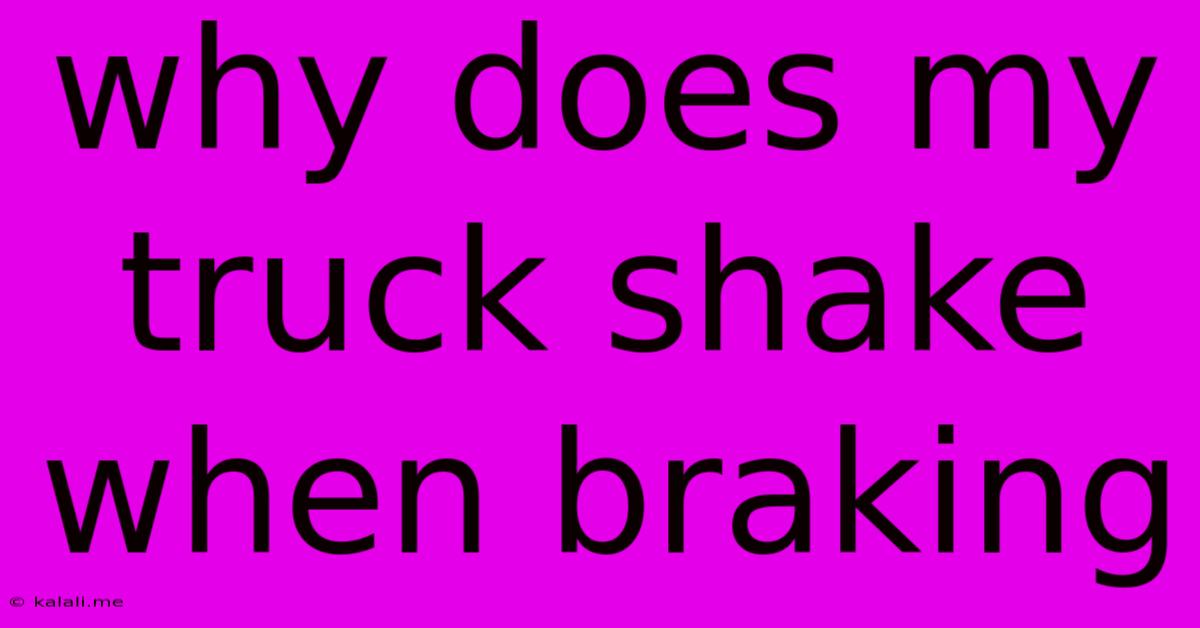Why Does My Truck Shake When Braking
Kalali
Jun 03, 2025 · 3 min read

Table of Contents
Why Does My Truck Shake When Braking? A Comprehensive Guide
Many truck owners experience the unsettling feeling of their truck shaking when braking. This isn't just an annoying inconvenience; it's a potential safety hazard. Understanding the root causes is crucial for addressing the problem effectively and ensuring safe driving. This article explores the common reasons why your truck might shake while braking, offering insights into diagnosis and potential solutions.
Common Causes of Truck Shaking During Braking
Several factors can contribute to a shaking truck during braking. Identifying the source requires careful observation and may necessitate professional inspection. Let's explore some of the most frequent culprits:
1. Worn or Damaged Brake Rotors
This is arguably the most common cause. Over time, brake rotors, the metal discs that your brake pads grip, wear down. Uneven wear creates a warped or uneven surface, leading to vibrations felt through the steering wheel and brake pedal. Severe rotor damage can manifest as a pronounced shudder or pulsating feeling.
2. Warped Brake Rotors
Heat is the enemy of brake rotors. Excessive heat, particularly from hard braking or prolonged downhill driving, can cause warping. A warped rotor will not make consistent contact with the brake pads, resulting in the shaking sensation.
3. Worn or Uneven Brake Pads
While worn brake pads themselves don't directly cause shaking, uneven wear can exacerbate problems with the rotors. If one brake pad wears down faster than the others, it puts extra stress on the corresponding rotor, potentially leading to warping and subsequent shaking. Regular brake pad inspection is crucial for preventative maintenance.
4. Wheel Bearing Issues
Damaged or worn wheel bearings can affect the smooth rotation of the wheels. This can translate into vibrations felt during braking, especially at higher speeds. You may notice other symptoms like unusual noises (grinding, humming) emanating from the wheels.
5. Suspension Problems
Issues within the suspension system, such as worn-out or damaged components (ball joints, tie rod ends, control arm bushings), can impact wheel alignment and introduce vibrations felt throughout the vehicle, including during braking.
6. Tire Problems
Unbalanced or improperly inflated tires can induce vibrations during braking. Tire wear that’s uneven can also cause a shaking sensation, especially if one or more tires are worn significantly more than others. Always maintain proper tire pressure and check for irregular wear patterns.
7. ABS Problems
While less common, problems with the Anti-lock Braking System (ABS) can occasionally manifest as shaking during braking. The ABS is designed to prevent wheel lockup, and malfunctions can disrupt the braking process, resulting in vibrations. A malfunctioning ABS will usually trigger a warning light on your dashboard.
Diagnosing the Problem
Pinpointing the exact cause often requires a professional inspection by a qualified mechanic. However, you can take some preliminary steps:
- Check your brake pads and rotors: Visually inspect them for wear and tear. Look for uneven wear patterns or obvious damage.
- Feel the brake pedal: During braking, notice the nature of the vibration – is it a consistent shudder or a pulsating feeling? This can provide clues about the source.
- Listen for unusual noises: Pay attention to any grinding, humming, or other unusual sounds emanating from the wheels or brakes.
Addressing the Issue
Depending on the diagnosis, solutions can range from simple repairs like replacing worn brake pads to more complex interventions such as rotor resurfacing or replacing damaged suspension components. Never attempt complex repairs yourself unless you possess the necessary skills and experience. Always consult a professional mechanic for proper diagnosis and repair.
By understanding the potential causes of braking vibrations and taking proactive steps towards maintenance and inspection, you can significantly reduce the risk of experiencing this potentially dangerous condition and ensure safer driving for yourself and others. Regular maintenance is key to preventing problems before they escalate.
Latest Posts
Latest Posts
-
How To Get Rust Off Grill
Jun 05, 2025
-
How To Disinfect A Leather Couch
Jun 05, 2025
-
Caesars Wife Should Be Above Suspicion
Jun 05, 2025
-
Does The Castle Need A Recruitment Beacon
Jun 05, 2025
-
Cant Sign Into Icloud On Mac Unknown Error
Jun 05, 2025
Related Post
Thank you for visiting our website which covers about Why Does My Truck Shake When Braking . We hope the information provided has been useful to you. Feel free to contact us if you have any questions or need further assistance. See you next time and don't miss to bookmark.